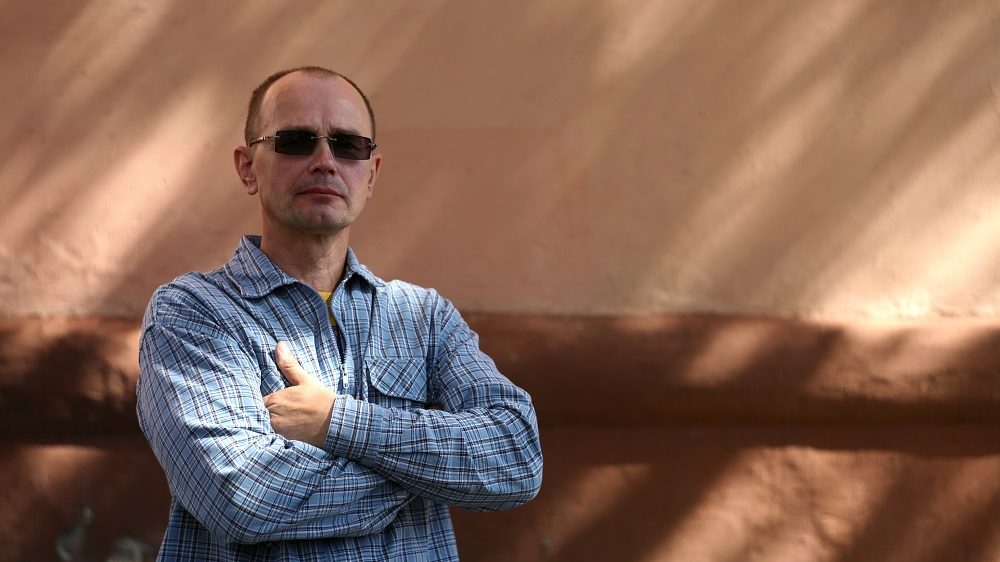This interview was originally published in Belarusian by the Barys Zvozskau Belarusian Human Rights House, as part of an ongoing series of interviews with human rights defenders who are alumni of International Law in Advocacy projects in Belarus (ILIA-BY), including as part of small projects within this such as Bring International Standards Home (BISH). The House has already shared stories (in Belarusian) of how Uladzimir Maliarchuk, an electrician from Vilejka, and Tatsiana Aheyeva, a lawyer from Minsk, joined human rights activism.
Aleh Matskevich, a son of a Soviet serviceman, is our next human rights hero. Matskevich was going to devote his life to military service. Yet, his studies in Belarus during the time when the country became independent made him a different person. Now, he lives in Barysaŭ, Minsk region, where he fights for freedom of peaceful assembly, freedom of expression, and the rights of people with disabilities.
I liked searching for foreign transmitters and wanted to come back to the army as a ‘coat officer’ [a contract-based member of the military].
Teacher is my first education. This was a random choice. When I graduated from high school, I discontinued my studies. We lived in Piečy [a military training centre in Barysaŭ] as my father was a serviceman. I was careless, and my high school diploma was not good, unfortunately. The reason might have been that my father, who had held me in check, left for Afghanistan two years before my graduation, and my mother was alone. My elder brother served in the army, and I followed suit.
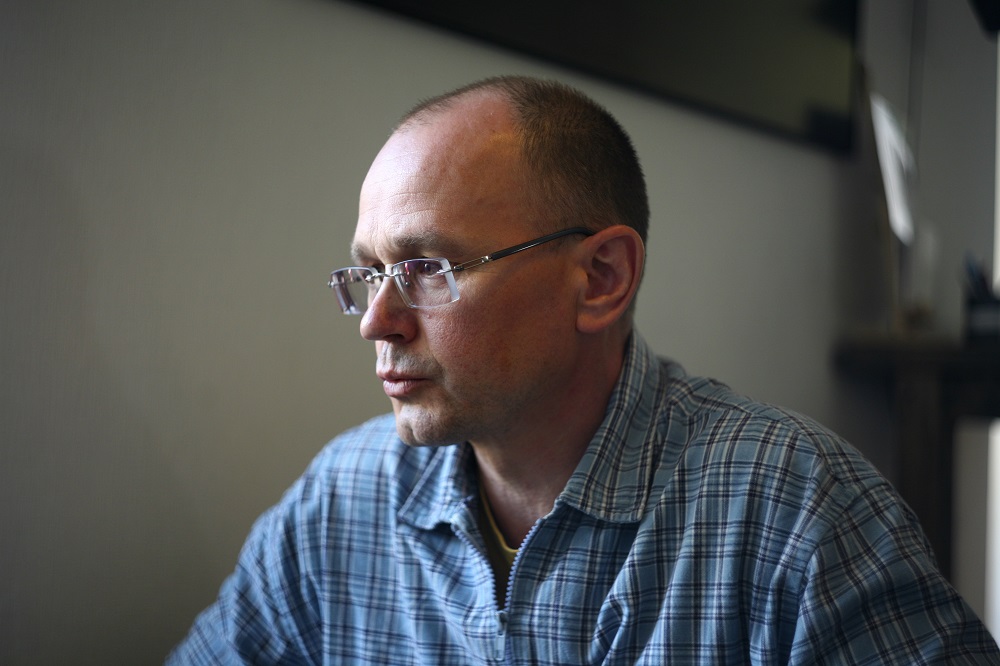
I served in the Moscow region in communications intelligence. I loved my technical job, which was about searching for and intercepting foreign transmissions. I wanted to come back to my military unit as a ‘coat officer’. However, I needed a university diploma for it. So, I went home in 1987 to obtain higher education in Belarus and to go back to Moscow to work. I opted for the history faculty of the pedagogical institute.
Our lectures would stop during the rallies, as we went to the square together with the teachers.
Upon my return, I spent almost a whole year on preparatory courses: the actual studies started in 1988. During my years at the institute, Belarus saw landmark changes. I joined university as a Komsomol [Communist Youth Movement] member and as someone who had nearly joined the [Communist] Party during my army service. All of a sudden, I was a completely different person upon the graduation.
The new building of the Belarusian State Pedagogical University, so-called ‘candle’, was facing the square. In 1990, our classes would stop during the great rallies. Together with our teachers, we would dart out into the square to join the protests. It was very liberal, compared to what we have now. Having got a taste of freedom, I pursue it now. Everything was different, including teachers and students. We had many discussions. We had a lot of freedom. I started changing. It was then that I set the goal of learning Belarusian, a language I had not known as I was released of Belarusian lessons as a son of a service man. I learnt it in the end, though it was hard. It feels strange now, but it was a challenge even to read in Belarusian, as I had to check so many words in the dictionary.
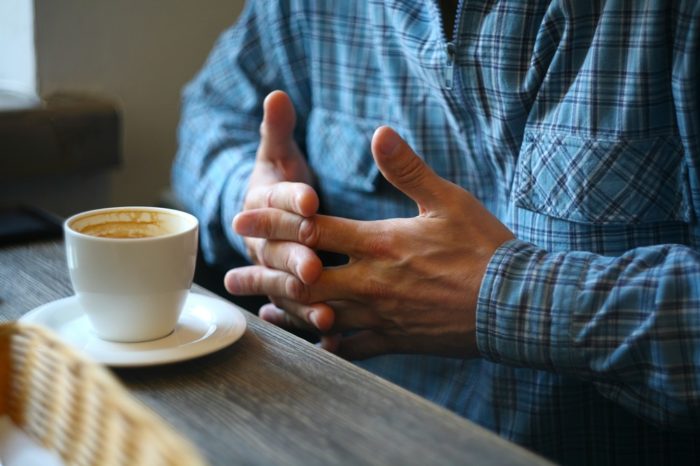
Once in those times, I wrote anti-communist flyers together with a friend of mine, and posted them all around the campus. My actual career as a teacher was very short. The wage was so miserable that I had to strike out on my own.
And then I met Liudmila Ulyashyna [advisor on International Law in Advocacy at Human Rights House Foundation] during one of those seminars. This was how I joined BISH.
I took another education as a lawyer at a private university in Minsk. It took me quite some time to join the human rights community. I met new people in Barysaŭ in 2004. Always sympathetic with those who defend truth, I had never been engaged in it before. I lived my own life. I met guys involved in opposition activities; we became friends. I helped them in the distribution of flyers and joined some street actions. Sometime later, I started communicating with human rights defenders in Barysaŭ. Honestly, it was not so much about human rights, and more about solving local issues through political campaigning; for example, we collected signatures for solving problems in the field of housing utilities. I observed elections, too. Through my contact with the human rights actors, I started cooperating with Viasna.
Once again, in 2007 or 2008, I met Liudmila Ulyashyna during one of those Viasna seminars in Chernihiv, Ukraine. She told me about the ILIA programme and encouraged me to apply, if interested. ‘Why not?’, I thought; new knowledge is always good. My application was approved, and so I joined BISH.
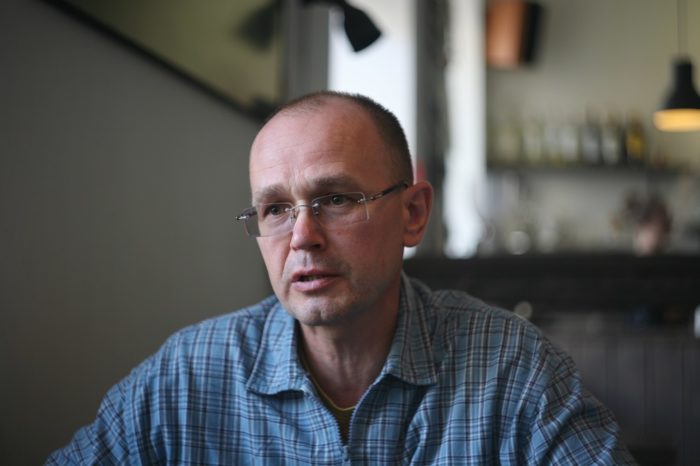
We kept arguing about who is better in defending people, a lawyer or a human rights defender?
It was somewhat difficult to learn, though interesting. During my BISH cycle, the group was full of lawyers. We had antagonistic views on defending human rights and defending people in general. For example, we had arguments with Aleh Aheyeu, who is now my good friend. [Aleh Aheyeu is a lawyer, human rights defender, and ILIA alumnus]. He was still a member of the Bar, before being disbarred. We kept arguing about who is better in defending people’s rights, lawyers or human rights defenders. We even played performances during breaks about how a human rights defender or a lawyer would act in a certain situation. Our colleagues mostly supported him; I enjoyed little support. These private discussions kept emerging during the classes. The late Barys Zvozskau would always try to settle them down. [Barys Zvozskau was a human rights defender and co-founder of the Belarusian Human Rights House, now named after him].
I found out later that the organisers marked debates between human rights defenders and lawyers as a challenge in their formal notes of the studies. My point was that human rights defenders are freer in their actions, because they are independent and have more possibilities for manoeuvre. I will not say who was right, but the time showed it. At the end of our courses, many lawyers did not dare to come to pick up their diplomas, because it was after the Square 2010. They faced the threat of disbarment, while the wave of repressions was moving on…
The concept of human rights still untranslated neither to Belarusian nor to Russian
Long ago, at the watershed in history, I read a saying by an American politician in a magazine. I tried to find the author on the web later on, unsuccessfully. He said: “The concept of human rights is still untranslated to Russian”. It stuck in my mind, though I did not understand the point.
Later, in the middle of my human rights activism, I kept occasionally coming back to this phrase. I am still thinking whether something has changed since then. Have human rights been translated into Russian or Belarusian? I can say now: the translation is there, but the meaningful content is absent, and our government is to blame. We can blame society for passivity; but the obligation to fill the translation the content lies with the state; it had to add the meaning to the concept. My learning of international human rights law at BISH helped me to fill the concept with my personal meaning. This is the merit of this programme, as it was the only channel for me to obtain that deep knowledge in international law.
Now I have gained knowledge about human rights, I hate hearing our officials sharing their views about what human rights are. For example, the Ministry of Interior published an article “They Shall Not Pass!” [about the LGBT movement allegedly being deemed to fail in Belarus in the promotion of their rights]. Since then, Belarusians travelling outside of the country to participate in Pride celebrations take and display posters showing Shunevich [Minister of Interior of Belarus] covered in kisses. It is funny and sad that he has disgraced himself in this way.
At some point, I had a second job at the association defending consumer rights. I helped people to compose complaints. During one of the meetings in Minsk, the now-minister of justice said from the very beginning: “You are the real human rights defenders! Human rights defenders are about really defending someone rather than just wagging their tongues”. How can he equalise consumer rights defenders to human rights defenders?
There is nothing about human rights in our law schools. It is not what is the worst, though. Teaching human rights in secondary schools is completely abandoned. I know it from my wife, a schoolteacher, that their curriculum includes a couple of hours dedicated to human rights. This is a mere formality. To illustrate how human rights were taught long ago in the Soviet Union: they would always start with the words ‘We must’. The Belarusian school is still sticking to this approach. Children grow up without knowing the point of human rights and how to use them in their lives. THIS is our society.
I’m so sorry I did not know him better
Barys Zvozskau as a personality, he was calm, thoughtful and very good at listening. He never expressed negative emotions. He could offer advice and share his opinion peacefully. In my view, Barys Zvozskau is a perfect human rights defender. Some human rights defenders express thoughts that make you sick. I think about them: how can you defend human rights if you obviously hate people? As a human rights defender, you are supposed to be a kind of a pastor and treat people with understanding.
I remember lectures by Barys Zvozskau about peaceful assembly. He also shared about how he became a human rights defender and learned from Marek Nowicki [a prominent Polish dissident and human rights defender]. I am very sorry I did not know him better. We met in 2010, shortly before he passed away. Apart from sessions and training, I never had communication with him; yet, I respected him a lot. I thank my stars for having met Barys Zvozskau. For the people who joined the programme after me, Zvozskau is a picture on the wall, while I knew him personally.
Naturally, the programme had an impact on my activities, including new topics and building new contacts with the human rights community. I am still active in BISH. I do my best to attend all meetings and meet alumni from my cycle and other cycles. Listening to people that share their experience is very interesting; disputes during the meetings are interesting, too.
Freedom of peaceful assembly. ‘I realise that prospects are slim if any… Yet, I will continue working’
I live and work in Barysaŭ. I work trying to make a difference on several subjects. First, the freedom of peaceful assembly, an issue I am concerned about and have been dealing with for years. Officials at the local executive committee probably consider me to be quite an inconvenience. I have abolished their decisions a couple of times. I forced the cancellation of their decision on allowable locations for peaceful assemblies in Barysaŭ about eight years ago. The decision had not been properly registered and failed the expert assessment, making them pass a new one. Yet, the new one was just as far from democratic standards of freedom of assembly.
I also sought to fight another decision of the Barysaŭ executive committee, falling short of both constitutional standards and international standards ratified by Belarus, and even of the Law on Assemblies. I have sent complaints to the Prosecutor General seven times, always receiving pointless formal responses. Finally, they stopped responding me. I took a legal action, but the court rejected my complaint, and the appeal did not help to break through this wall.
Now, I’m working on a draft local decision on freedom of free assembly. My colleagues, such as Pavel Levinau, help me in this effort. He has drafted such a decision for his municipality, Viciebsk, and I want to do the same. I want to be invited to the executive committee session to see my draft decision discussed. I am now going to send a proposal to the executive committee of Barysaŭ. I am not going to stop. I realise prospects are slim if any… Yet, I will continue working.
Once, I submitted an individual communication in the case of a violation of my right to the freedom of peaceful assembly. Together with Ms. Statkevich, we applied to hold a picket-style protest and were turned down. After a trial, I sent a communication to the UN Human Rights Committee. The communication was accepted and the violation by the authorities found. I have helped a few other people submit communications on the same subject.
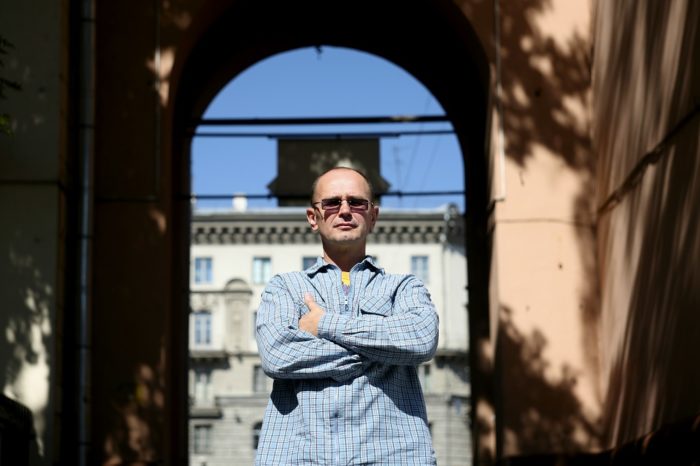
Freedom of expression
Freedom of expression is another subject that interests me. I closely cooperate with journalists and local media, such as Borisovskiye Novosti and ex-press.by. I assist them in all cases when they need to complain about denied access to information. In addition to media in Barysaŭ, I also cooperate with the branch of the Belarusian Association of Journalists in Maladziečna and other branches around the Minsk Region.
Rights of people with disabilities
Recently, I have taken interest in the rights of people with disabilities. Shifts in this area are possible in Belarus. Belarus signed the Convention on the Rights of Persons with Disability a short time ago. This is a major step ahead, even though Belarus has not ratified the Optional Protocol. Implementing these rights is now possible.
This topic is so interesting for me; along with the disabled people, it can affect anyone. If you fracture your leg and walk on crutches, you have a temporary disability. It also affects moms with strollers. It is about anyone: tomorrow, a pavement edge can become an invincible obstacle for anyone who is healthy and mobile today.
Out of 10 million people living in Belarus, only Mikhas Kukabaka was aware about human rights back in the 70s. Today, thousands are aware
The trend of awareness about human rights in Belarus is very positive. Back in the 70s, only Mikhas Kukabaka knew what they are, out of 10 million people living in Belarus. Today, thousands are aware of them. This is an ongoing and unstoppable process. In a decade or two, the changing society will bring change to the State.
This article was published as part of the September 2018 newsletter from the Human Rights Houses and HRHF.


